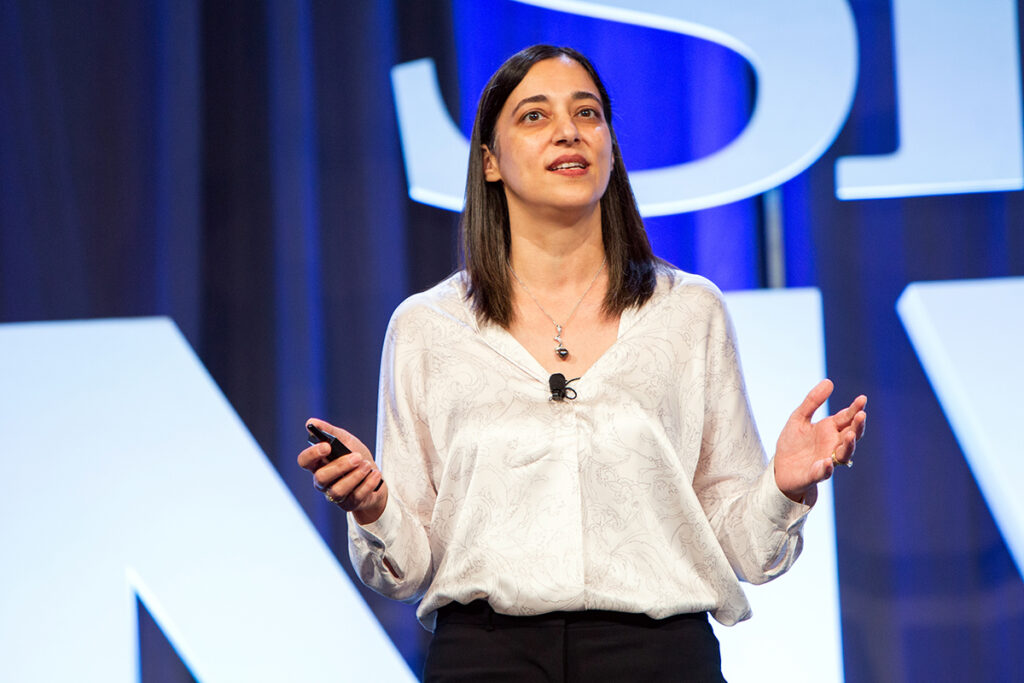COVID-19 Has Shown the Power of HM
Amid the unspeakable tragedies and hardships that the COVID-19 pandemic brought to the medical community are examples of stunning acts of innovation, compassion, and old-fashioned effort.

Dr. Nasim Afsar, MD, MBA, MHM
Nasim Afsar, MD, MBA, MHM—who has served on SHM’s board of directors and is now chief health officer at electronic health record company Cerner—doesn’t want people to forget those stories. Hospitalists should look to these bright spots for inspiration and motivation to continue improving health care, she said in a keynote speech at SHM Converge in Nashville, Tenn. in April.
“Never again do we have the right to say, ‘It can’t be done,’” she said. “Because you know what? We did it.”
She issued a challenge to the audience gathered for the plenary session.
“We’ve got one goal, and that’s to create the ‘Converge Effect,’” she said. “What’s the Converge Effect? It’s all of us, all nearly 3,000 of us, coming here together in one place, in Nashville, and looking at how we’re going to think differently, how we are going to do things differently, on behalf of our patients and communities back home, to change health care for the better.”
She asked the audience members to write down a new idea, connect with someone at the conference or back home, and commit to doing something differently to improve care.
The achievements she pushed the crowd to build from were, of course, possible only because of desperate challenges posed by the pandemic. Personal protective equipment (PPE) was as vital as it was scarce, and sick patients flooded the hospital. In some settings, 80% of nurses were re-using their masks.
“Some organizations had to devise plans to assess the comorbidities of patients and try to figure out what the likelihood of survival was, because if it wasn’t high, maybe someone didn’t get an ICU bed,” Dr. Afsar said. “We had to do unthinkable things.”
But the medical field mounted a powerful response, she said. Public-private partnerships were formed to help supply PPE, non-biohazardous medical waste was recycled into PPE, and care at home became more common.
“We weren’t really comfortable with adopting that until the pandemic hit, and then all of a sudden across the board we figured out how to care for patients in a completely different setting,” she said.
Before March 2020, less than 10% of medical care was provided with telehealth, but a few months into the pandemic the vast majority of visits were performed by telehealth.
Telehealth, Dr. Afsar said, is here to stay, but “we have to think through how we’re going to appropriately embed these technologies in everything that we do, be it in the care of the hospitalized patients, all the way to ambulatory care.”
This has to be done thoughtfully, she said, in a way that’s safe, doesn’t add to cost, and doesn’t lead to greater disparities in health care.
The pandemic has also drawn attention to health care equity, with social and structural factors affecting outcomes. For instance, not everyone can socially distance if they have to rely on public transportation or live in a multi-generational home. Infection rates and death rates were found to be closely related to household income, race, and rural versus urban living.
But health care workers rose to the occasion in this arena as well. In New York, mobile vaccine teams with expertise in various languages helped break down barriers to vaccination. In Philadelphia, 11 organizations joined forces to combat racial and social disparities affecting health outcomes.
Dashboards were created to help identify vulnerable populations, and mobile food markets were set up to help neighborhoods with at-risk families, Dr. Afsar said.
“Quality improvement without equity is really a hollow victory,” she said. “Make health equity a priority in everything you do.”
COVID-19 also led to a mental health pandemic, with anxiety and depression—and a general feeling of aimlessness and lack of motivation that has come to be known as “languishing.”
The Centers for Disease Control and Prevention found that the percentage of people with symptoms of anxiety and depression increased nationwide during the pandemic, and these psychological burdens led many health workers to leave the field.
In response to this problem, though, came more innovations and moving acts of goodwill, Dr. Afsar said.
Mobile apps were created to help address depression and anxiety and were found to bring sustained results. Medical professionals from Intermountain Healthcare in Utah went to New York to help overwhelmed health care workers. At Baystate Health hospitals in Massachusetts, workers created a mood of triumph and hope by playing the “Rocky” theme song whenever a COVID-19 patient was discharged.
Medical students, not yet able to provide care, helped nonetheless by taking on other tasks—childcare, pet services, and running errands for those working in hospitals. In San Antonio, after a wedding had been put off when the groom-to-be was hospitalized with severe COVID-19, health care workers performed a marriage ceremony at the hospital.
“There is a lot that we can do together to advance the health and care of our patients and our communities,” Dr. Afsar said. “We have to take an active role and make a difference in health care.”
Tom Collins is a medical writer in South Florida.